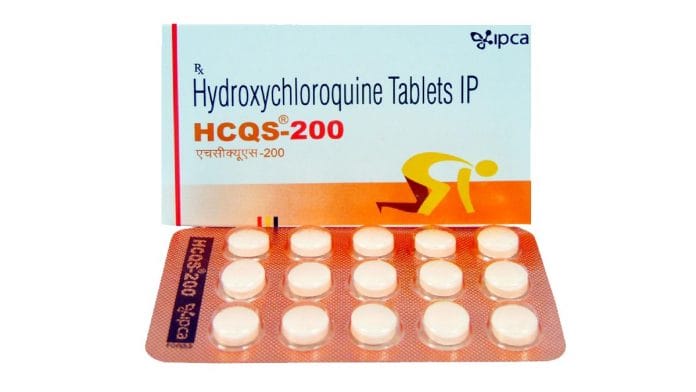New Delhi: Two groups of doctors from AIIMS, Raipur, and AIIMS, New Delhi, have raised questions on the methodology of a study by the ICMR, which had stated that hydroxychloroquine or HCQ can help lower the risk of contracting Covid-19 among healthcare workers.
The Indian Council of Medical Research had issued an advisory to begin using HCQ in March, but it had drawn criticism for lacking scientific evidence that the drug works against the novel coronavirus. At the time, there were no studies showing that the anti-malarial drug can prevent Covid-19.
Subsequently in May, the ICMR had announced that consuming hydroxychloroquine reduces the chances of getting infected with Covid-19. It then released an advisory recommending the expansion of the usage of HCQ as a preventive treatment against the novel coronavirus. The full study was published on 20 June.
But now, in a correspondence published in the Indian Journal of Medical Research (IJMR) last Saturday, AIIMS, Raipur, doctors Habib M.R. Karim and Ghazal Ahmed have questioned the methodology of the study.
“The authors include only symptomatic healthcare workers (HCWs) who were tested positive or negative in cases and controls. As a good number of individuals with SARS-CoV-2 infection are asymptomatic, the inclusion of only symptomatic HCWs is unlikely to represent the entire HCWs taking and/or not taking HCQ as prophylaxis,” they wrote.
The duo also argued that the findings should have also been analysed with respect to the work environment and procedures — that is, whether healthcare workers in the intensive care units caring for confirmed patients and carrying out procedures put them at higher risk of infection than health workers in general, who are equally protected from Covid-19 with HCQ.
They argue that such data should have been presented for better acceptance of the results.
In its response published in the same journal, authors of the ICMR study, including epidemiologist Raman Gangakhedar and director-general of the apex research body Balram Bhargava, defended the study design, saying that sticking only to symptomatic participants in the study helped ‘reduce biases’. They, however, did not elaborate on this.
They also added the evidence from randomised controlled trials (RCTs) are awaited to support further actions pertaining to the use of HCQ.
Also read: India sold over 22 crore HCQ tablets in last 3 months against 24 crore in all of 2019
Questions posed by AIIMS Delhi team
In a separate correspondence, also published in the IJMR, doctors of AIIMS, Delhi, Praveen Tirlangi, Adil Rashid Khan, Devashish Desai and Manish Soneja highlighted some other limitations of the study.
The ICMR study had noted that less than 2 to 3 weekly doses of HCQ caused a spike in the number of Covid-19 cases.
The authors attributed this to the behavioural change among healthcare workers, saying that those who started taking HCQ possibly became less careful about taking other precautions under a false sense of security.
However, Tirlangi and his team pointed out: “Healthcare workers who have not been infected are more likely to continue HCQ prophylaxis (prevention) for a longer duration. Thus leading to a spurious association between prolonged HCQ prophylaxis and lower infection rates.”
Moreover, given the numerous negative studies on HCQ as well as the negative press coverage on the same, the idea that healthcare workers became complacent after taking HCQ is unlikely, the researchers said.
AIIMS, Delhi team had defended HCQ earlier
The same AIIMS, Delhi, team had, however, defended the use of HCQ among healthcare workers in a study published in The Lancet in May in which a team of epidemiologists from Mahatma Gandhi Institute of Medical Sciences in Maharashtra and Safdarjung Hospital, New Delhi, had questioned the ICMR’s recommendation for HCQ use despite the lack of evidence.
Tirlangi’s team, in the latest correspondence, said that it has been previously demonstrated in SARS-CoV — a coronavirus strain that caused an epidemic in 2002 — that short duration treatment of SARS-CoV-infected cells with ammonium chloride paradoxically increased the risk of infection by 2-4 times.
“Thus, it is biologically plausible that insufficient concentrations of HCQ may paradoxically increase the risk of infection,” they wrote. The team has recommended increasing the HCQ dosage at an early stage.
“Such a regimen should be first investigated before extending HCQ prophylaxis for a larger population,” the team wrote.
Responding to this, the authors of the ICMR study said that it was inappropriate to extrapolate findings from in-vitro or lab studies of SARS-CoV to explain why short duration of HCQ should increase the risk of infection for SARS-CoV-2.
They added that any changes to HCQ dosage can only be done after conducting appropriate laboratory studies.
Also read: The HCQ study mess: How 3 Indian researchers put reputation of Lancet, NEJM at stake






